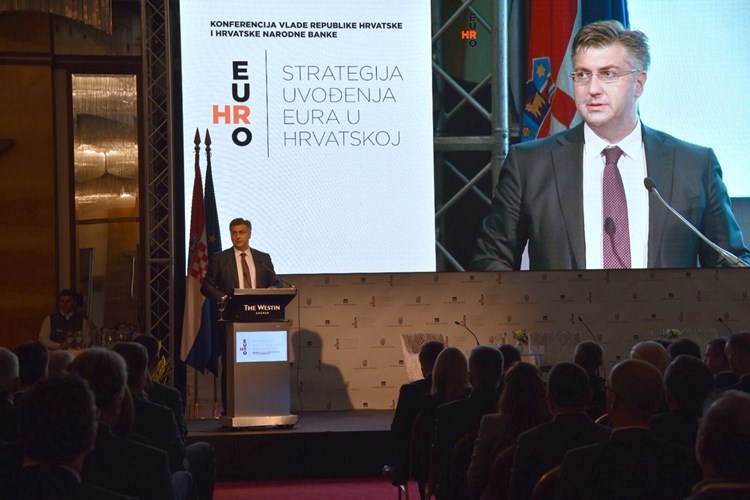- Published: 30.10.2017.
PM Plenkovic: Euro to bring global, political and economic credibility to Croatia
Speaking at a conference on a strategy for the adoption of the euro in Zagreb on Monday, Prime Minister Andrej Plenkovic said that in the EU accession treaty Croatia already expressed its willingness to join the euro zone, but noted that it had not met all the criteria yet.
Plenkovic said that by adopting the euro, Croatia would join the close circle of member states advocating closer EU integration, adding that the euro would bring global, political and economic credibility to Croatia. He said he saw the euro as "an instrument in our struggle to increase growth and employment."
"Citizens will feel the euro in a very concrete and tangible way," the prime minister said. The risk of oscillation of the kuna-euro exchange rate would disappear, risk premiums on interest rates would decrease, which means more favourable borrowing terms for private individuals, companies and the government, and costs of transactions would be lower, he said.
"In that way Croatia will become even more attractive to tourists and investors from the euro area, as a result of which we will increase our competitiveness," the PM noted.
In the last 12 years, from 2004 to 2016, prices rose by 23 percent in the euro zone and by 31 percent in Croatia. At the same time, in central European countries which adopted the euro average gross salaries grew faster than in Croatia. For example, they grew by 37 percent in Slovenia, 60 percent in Slovakia, 88 percent in Lithuania and Estonia, 136 percent in Latvia, while in Croatia they grew by 29 percent, the prime minister said.
"That's why the slogan, which leads to the wrong conclusion that we will get European prices and keep Croatian wages, does not hold water. This myth needs to be debunked and thoroughly discussed," Plenkovic said.
He said that the common currency would also boost the Croatian economy and help bring it closer to the level of the most developed EU countries.
Plenkovic recalled that European Commission President Jean-Claude Juncker said in his speech in Strasbourg a few days ago that Croatia should be brought closer both to the Schengen area and the European monetary union. The Commission will obviously provide technical and expert assistance to Croatia to carry out this process in the most effective way, he added.
Plenkovic said that Croatia had met almost all criteria for the adoption of the euro, citing price stability, the level of long-term interest rates and a budget deficit of below three percent of GDP. He said that public debt was above the required limit of 60 percent of GDP but was showing a decreasing trend.
Speaking of the performance of his government and unfavourable circumstances that preceded its term, Plenkovic mentioned the case of the heavily indebted Agrokor food and retail conglomerate, saying that it had posed the biggest threat to the national economy since the country gained independence in the early 1990s, with a potential risk of bankruptcy and loss of tens of thousands of jobs.
"We have prevented all that. Sometimes I get the impression that many of the stakeholders and observers are unaware of the consequences that were averted and today they speak as if nothing bad was going to happen. A little bit more remembering and a greater sense of reality would do good in comments on this process," Plenkovic said.
The conference was organised by the government and the Croatian National Bank (HNB).
Text: Hina
